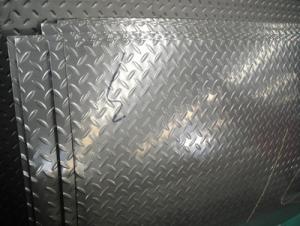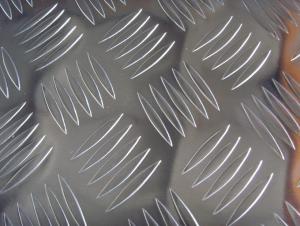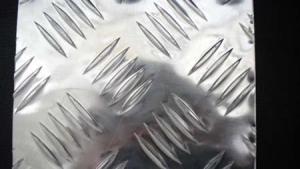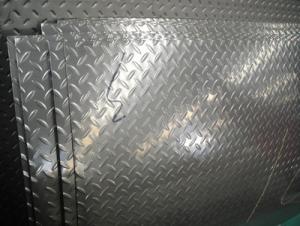Five Bar Pattern 5052 4mm Aluminum Checkered Plate
- Loading Port:
- Shanghai
- Payment Terms:
- TT or LC
- Min Order Qty:
- 5 m.t.
- Supply Capability:
- 9000 m.t./month
OKorder Service Pledge
OKorder Financial Service
You Might Also Like
Product Description
5052 4mm aluminum checkered plate
Alloy:1050 1060 1070 1100 3003 5052
Partterns:diamond ,Two,three,Five Bar
Temper:O-H112
Thickness:0.3-8 mm
packing:wooden pallet,wooden case or as customer request
Application of Aluminum Durbar floor plate : Indoor and outdoor decoration, flooring, stairs, construction
Payment: TT or LC .
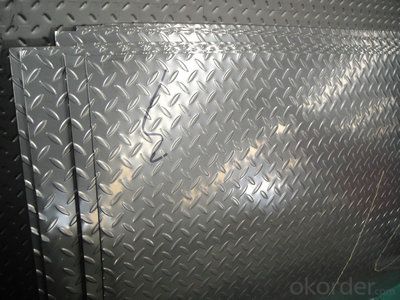
Company Information
Through the years, we have built many modern production lines, including one 1+2 hot rolling production line, six 2,450, 2,050, 1,650 and 1,450mm cold rolling lines, two 1,650mm foil rolling production lines, two 1,850mm continuous rolling production lines and one roll coating production line. Besides, we also bring in 8 x 20 annealing furnaces, tension leveled machines, tension pre-stretch machines, cutting machines, cleaning equipment, testing machines and packing equipment from at home and abroad to be able to complete various clients' requirements
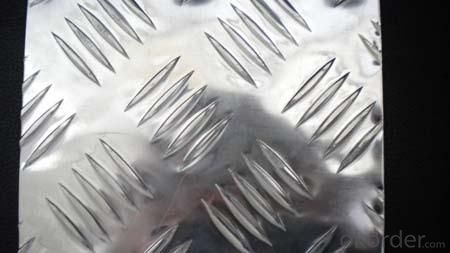
FAQ
Q: Which country CNBM export to ?
A: Export to over 30 countries, especial Brazil, Chile, Iraq, Australia.etc
Q: What can we expect from CNBM?
A: Yes, as customer request
Q: Can I have some samples?
A: Of course, samples are free (1-3 pcs) or 2-3 kg
Q: When can we get samples and goods?
A: Samples will be sent immediately if have stock, make new will take 2-3days.
Goods will be shipped within 20 days after order confirmed
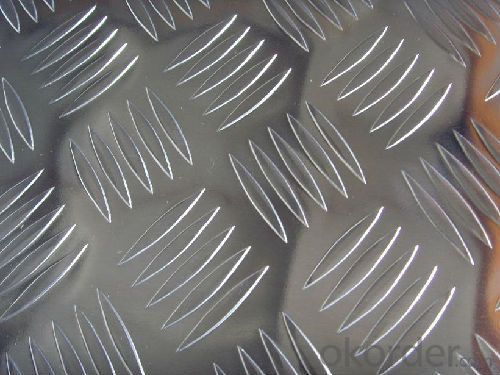
Packaging & Delivery
| Packaging Details: | Wooden Pallet, Wooden Case, As Customzed, etc. |
| Delivery Detail: | 20~25DAYS |
- Q:Can aluminum coils be used in the production of aluminum garage doors?
- Yes, aluminum coils can be used in the production of aluminum garage doors. Aluminum coils are often used as the primary material for manufacturing aluminum garage doors due to their durability, lightweight nature, and resistance to corrosion.
- Q:How do aluminum coils resist corrosion?
- Aluminum coils are able to resist corrosion due to their unique chemical composition and protective oxide layer. Aluminum is a highly reactive metal, but it forms a thin layer of aluminum oxide on its surface when exposed to air. This oxide layer acts as a protective barrier, preventing further reaction with the environment. This layer is self-repairing and continues to form even when it gets damaged, providing long-lasting protection against corrosion. Additionally, aluminum coils can be further protected by applying coatings or treatments that enhance their resistance to corrosion. These coatings act as an additional layer of defense, shielding the coils from potential corrosive agents. Overall, the combination of the natural oxide layer and optional coatings makes aluminum coils highly resistant to corrosion, ensuring their durability and longevity in various applications.
- Q:Can aluminum coils be used in electrical transformers?
- Electrical transformers can indeed utilize aluminum coils. Although copper is typically the preferred material for transformer windings, there has been a growing trend towards utilizing aluminum due to its cost-effectiveness and lighter weight. Distribution transformers, which are smaller in size and operate at lower voltages, often employ aluminum coils. However, it is important to consider certain factors when using aluminum coils in transformers. Aluminum has a lower conductivity than copper, necessitating larger cross-sectional areas for the aluminum coils to compensate for this difference. Furthermore, aluminum has a higher coefficient of thermal expansion compared to copper, requiring proper precautions to accommodate the differential thermal expansion between the aluminum windings and other transformer components. In conclusion, aluminum coils can be suitable for specific transformer applications, but it is crucial to meticulously execute the design and manufacturing process to ensure optimal performance and reliability.
- Q:Can aluminum coils be used in electrical busbars?
- Yes, aluminum coils can be used in electrical busbars. Aluminum is a commonly used material for busbars due to its high electrical conductivity, low cost, and lightweight properties. Aluminum coils can be easily formed into various shapes and sizes to fit specific busbar requirements. Additionally, aluminum has good thermal conductivity, which allows for efficient heat dissipation in high current applications. However, it is important to consider the current carrying capacity, mechanical strength, and corrosion resistance of aluminum coils when selecting them for busbar applications.
- Q:What are the vibration damping properties of aluminum coils?
- Aluminum coils have excellent vibration damping properties, making them an ideal choice for various applications that require vibration control. Due to their high stiffness and low density, aluminum coils effectively absorb and dissipate vibrations, reducing the amplitude and frequency of oscillations. This vibration damping ability is beneficial in industries such as automotive, aerospace, and electronics, where minimizing vibration is crucial for performance, durability, and overall user experience. Additionally, aluminum coils' ability to dampen vibrations helps to reduce noise levels, leading to quieter operations and environments. Overall, aluminum coils' vibration damping properties contribute to improved product performance, increased safety, and enhanced user comfort.
- Q:This is not for around the house. It is for my lab. I am pretty sure these one wires are Aluminum, but I need the connector they were made with and the power cable is copper. Would it be okay to still try to join the two.
- different metal heat at a different rate use oxigaurd and wire nuts
- Q:What is the difference between hot rolled and cold rolled aluminum coils?
- The production process and resulting properties of the final product are what differentiate hot rolled and cold rolled aluminum coils. To produce hot rolled aluminum coils, aluminum ingots are heated above their recrystallization temperature, typically around 450°C (842°F), and then rolled through a series of rollers to reduce thickness and shape them into coils. This process allows for fast production and the ability to create larger coils. However, hot rolling can result in a less precise and less smooth surface finish, with potential for surface defects and oxidation. On the other hand, cold rolled aluminum coils are produced by further processing hot rolled coils. First, the hot rolled coils are pickled, or chemically treated, to remove any mill scale or impurities. Then, they undergo cold rolling, where they are passed through a series of rollers at room temperature. This process yields a more precise and smoother surface finish, with excellent dimensional accuracy and tighter tolerances. Cold rolling also enhances the strength and hardness of the aluminum, making it more suitable for certain applications. In terms of properties, hot rolled aluminum coils generally have lower strength and hardness compared to cold rolled coils. They also have a higher chance of surface defects and oxidation due to the high temperature involved in the production process. On the other hand, cold rolled aluminum coils exhibit higher strength and hardness, as well as better surface finish and dimensional accuracy. These properties make cold rolled aluminum coils more suitable for applications that require higher quality and precision. Ultimately, the choice between hot rolled and cold rolled aluminum coils depends on the specific requirements of the end-use application. Hot rolled coils are often employed in applications where speed and cost-effectiveness are prioritized, while cold rolled coils are preferred for applications that demand higher quality, precision, and strength.
- Q:Im trying to make a aluminum ring. I want it to be rock hard. PLZZAnswers that work get best answer
- Dont use foil from the kitchen. Pure and simple. Get someone to machine you a piece of solid aluminum. You can't change the metallurgical properties of metal.
- Q:Can aluminum coils be used in the production of aluminum downspouts?
- Yes, aluminum coils can be used in the production of aluminum downspouts. Aluminum coils are commonly used in the manufacturing process of downspouts as they can be easily formed and shaped into the desired downspout design. The flexibility and durability of aluminum make it an ideal choice for downspout production, ensuring longevity and resistance to corrosion.
- Q:Can aluminum coils be used in wastewater treatment plants?
- Indeed, wastewater treatment plants can utilize aluminum coils. These coils are frequently employed in the fabrication of heat exchangers, which play a crucial role in wastewater treatment plants. Heat exchangers function by transferring heat from the wastewater to the treatment procedure, thereby enhancing treatment efficiency and minimizing energy usage. Aluminum coils are favored in certain situations due to their exceptional thermal conductivity, lightweight nature, and resistance to corrosion. These characteristics render them suitable for the demanding conditions found in wastewater treatment plants. Furthermore, aluminum coils are cost-efficient and possess a prolonged lifespan, thus establishing them as a dependable option for implementation in wastewater treatment facilities.
1. Manufacturer Overview |
|
|---|---|
| Location | |
| Year Established | |
| Annual Output Value | |
| Main Markets | |
| Company Certifications | |
2. Manufacturer Certificates |
|
|---|---|
| a) Certification Name | |
| Range | |
| Reference | |
| Validity Period | |
3. Manufacturer Capability |
|
|---|---|
| a)Trade Capacity | |
| Nearest Port | |
| Export Percentage | |
| No.of Employees in Trade Department | |
| Language Spoken: | |
| b)Factory Information | |
| Factory Size: | |
| No. of Production Lines | |
| Contract Manufacturing | |
| Product Price Range | |
Send your message to us
Five Bar Pattern 5052 4mm Aluminum Checkered Plate
- Loading Port:
- Shanghai
- Payment Terms:
- TT or LC
- Min Order Qty:
- 5 m.t.
- Supply Capability:
- 9000 m.t./month
OKorder Service Pledge
OKorder Financial Service
Similar products
New products
Hot products
Related keywords
